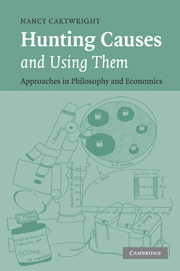Book contents
- Frontmatter
- Contents
- Acknowledgements
- Introduction
- Part I Plurality in causality
- Part II Case studies: Bayes nets and invariance theories
- 5 Preamble
- 6 What is wrong with Bayes nets?
- 7 Modularity: it can – and generally does – fail
- 8 Against modularity, the causal Markov condition and any link between the two: comments on Hausman and Woodward
- 9 From metaphysics to method: comments on manipulability and the causal Markov condition
- 10 Two theorems on invariance and causality
- Part III Causal theories in economics
- Bibliography
- Index
8 - Against modularity, the causal Markov condition and any link between the two: comments on Hausman and Woodward
Published online by Cambridge University Press: 03 December 2009
- Frontmatter
- Contents
- Acknowledgements
- Introduction
- Part I Plurality in causality
- Part II Case studies: Bayes nets and invariance theories
- 5 Preamble
- 6 What is wrong with Bayes nets?
- 7 Modularity: it can – and generally does – fail
- 8 Against modularity, the causal Markov condition and any link between the two: comments on Hausman and Woodward
- 9 From metaphysics to method: comments on manipulability and the causal Markov condition
- 10 Two theorems on invariance and causality
- Part III Causal theories in economics
- Bibliography
- Index
Summary
Introduction
This chapter is a commentary on a rich and intricate piece, ‘Independence, Invariance and the Causal Markov Condition’ by Daniel M. Hausman and James Woodward, which appeared in the British Journal for the Philosophy of Science in 1999. In this single article Hausman and Woodward defend two distinct theses with entirely separable arguments. Both theses are about causality and both are important.
The first thesis is that equations representing functional relations will be true causal laws if they are invariant under interventions into the independent variables. (They call this level invariance.) I found Hausman and Woodward's discussion of this thesis confusing. The primary reason, it turns out, is that they use different senses of ‘intervention’ and different senses of ‘invariance’ in the paper and they sometimes shift between them without saying so, probably because the two authors come to their joint work with different paradigms. But their thesis is true, and it is of considerable practical import since it provides a method for testing causal hypotheses. In section 8.2 I shall remark on these various uses as a help to other readers; and I shall back up Hausman and Woodward's claim by pointing to proofs that show that it is true under various different formulations, so long as the concepts employed line up in the right way.
The second thesis has two parts. (1) Our concept of causal law implies that each separate effect in a set of causal laws must be independently manipulable. (They call this manipulability.)
- Type
- Chapter
- Information
- Hunting Causes and Using ThemApproaches in Philosophy and Economics, pp. 97 - 131Publisher: Cambridge University PressPrint publication year: 2007

